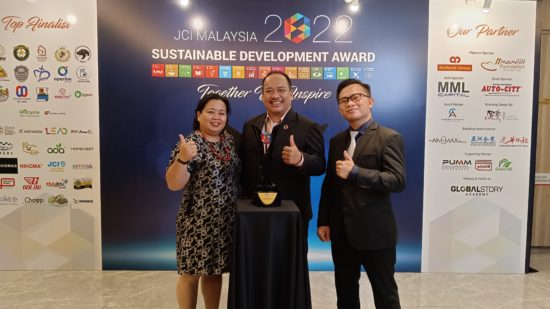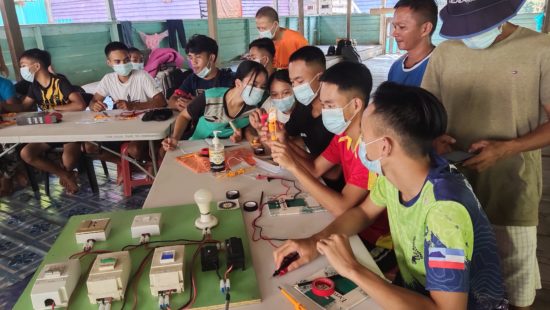Adrian Lasimbang is the founder of TONIBUNG, a social enterprise that promotes capacity building and renewable energy for rural communities in Malaysia. He is the recipient of the Global Ties U.S. 2022 IVLP Alumni Award for Social Innovation and Change for his work on community engagement and climate activism. Adrian participated in the 2010 International Visitor Leadership Program (IVLP), “NGO and Civic Activism,” programmed by the Institute of International Education (IIE), in partnership with WorldOregon, GlobalAustin, Utah Council on Citizen Diplomacy, Santa Fe Council on International Relations, and Global Ties Miami. We spoke with Adrian about his IVLP experience, how exchange programs can be used to target climate change, and the importance of community-driven initiatives.

TONIBUNG received the 2022 Malaysia Sustainable Development Awards for providing affordable clean energy to communities and its contributions to eliminating poverty. Both images courtesy of Adrian Lasimbang.
Many sources describe you as a climate activist, an indigenous leader, and an environmental conservationist. How do you introduce yourself and the work that you do?
I began advocating for environmental and indigenous peoples’ rights in high school, following in the footsteps of my older sisters who are activists themselves. Having been exposed to environmental issues at a young age, I started to pick up on issues related to biodiversity conservation and later, climate change. Working with rural communities exposed me to many issues and needs, which led me to study appropriate technologies and sustainable development.
I describe myself as a self-taught innovator and social entrepreneur since I have been involved in innovations to bring social change and empowerment to marginalized communities in Borneo.
You are the founder of TONIBUNG. What inspired you to create the organization? How did participating in the 2010 IVLP “NGOs and Civic Activism” shape your work?
I founded TONIBUNG together with my friends in my village in 1998 as a means of surviving the Asian economic crisis. All of us at that time were just fresh grads; we lost our jobs and it was very hard to get a new job. So, we created TONIBUNG to organize ourselves to do odd jobs. We went back to farming by starting a project to plant rice in abandoned rice fields in our district of Penampang. Rice is very important in our culture but unfortunately, the rural-urban migration during my generation has led to many rice fields to be abandoned as there are not enough human resources to work in the fields. Due to rapid urbanization and changes in lifestyles, our cultural heritage as an indigenous Kadazan community is being threatened. We had to do something; the economic crisis was a blessing in disguise.
We were faced with the challenge of balancing development and cultural heritage: how can we continue our rice farming but, at the same time, participate in rapid economic development? We introduced some mechanization in rice planting to reduce the burden of work and inspire other youths to also go back to rice farming. The mechanization project led us to set up our Innovative Skills Training Center and reach out to communities in other districts.
TONIBUNG was built on the NGO model of a grant-based approach. In 2008, Malaysia was elevated to a middle-income country and the international grant that we used to rely on for our operations stopped flowing into Malaysia so we had to adapt to survive. I’m very fortunate to participate in the 2010 IVLP because during the program, I was introduced to social entrepreneurship and how NGOs and other nonprofit organizations operate in the United States. The lessons I learned led us to transform TONIBUNG into a social enterprise to effectively continue our community outreach program. I was also inspired by the work of nonprofits in Portland, Oregon. I introduced the idea of creating a maker space to enable other social enterprises to develop their prototype. TONIBUNG set up CREATE (Center for Renewable Energy and Appropriate Technologies) based on the maker space model.
During the 2010 IVLP, I also got the opportunity to learn about the importance of local governance and the wisdom of Native Americans in the Pueblo Indian reservation in Santa Fe, New Mexico. In Borneo, we have our native courts system, but it is underutilized. Inspired by the local governance in the reservation, I started to explore the possibility of using our native law to protect the watershed areas for our Micro Hydro system. Using local wisdom of “gompi-guno”, meaning “use and protect,” we started to develop community watershed conservation protocols. To date we have established 30 different community watershed conservation protocols covering approximately 5,000 hectares of forest.
In your opinion, how can exchange programs like IVLP help actively combat issues such as climate change?

Renewable energy training session with local youth.
An exchange like IVLP can create awareness on issues such as climate change and encourage meaningful policy discussions with various levels of governance. The program also encourages the exchange of knowledge from different participants from countries around the world to enable greater cooperation in combating global issues such as climate change. The exchange of knowledge and exposure to different organizations in the United States provides learning opportunities and inspiring ideas to act on issues in people’s respective countries.
Community involvement is at the heart of your work. How do you involve local populations to create community-led solutions, and why does this matter?
Our main strategy for the sustainability of any project that we implement is to identify and work with local champions in the community. We have developed a community-based model that involves the community, especially the local champions, in all stages of our project. We also have adopted the framework of Free, Prior, and Informed Consent (FPIC), which is important for indigenous communities and based on the UN Declaration on the Rights of Indigenous Peoples (UNDRIP), because community participation is fundamental for community empowerment and self-determination. Empowering the community to make collective decisions and training leaders will lead to better governance of resources and open up space for sustainable economic development for the community.
What advice do you have for people who want to get involved in environmental activism, but are not sure where to start?
My advice to those who want to get involved in environmental activism is to start by spending time learning the issues on the ground. Talk to the most vulnerable groups such as farmers, indigenous communities, and the urban poor. You should listen to how important natural resources are to them to know how the degrading environment impacts their lives. Secondly, participate in movements in your community, build your network, and start a small personal initiative from your home or neighborhood. You can also refer to the UN Sustainable Development Goals (SDGs) and select one or two of the 17 SDGs that you want to commit to contribute. This will provide you with goals and a framework to be an environmental activist that contributes to a global movement. I believe that global change starts when people take local action: “Local action, global impact.”
